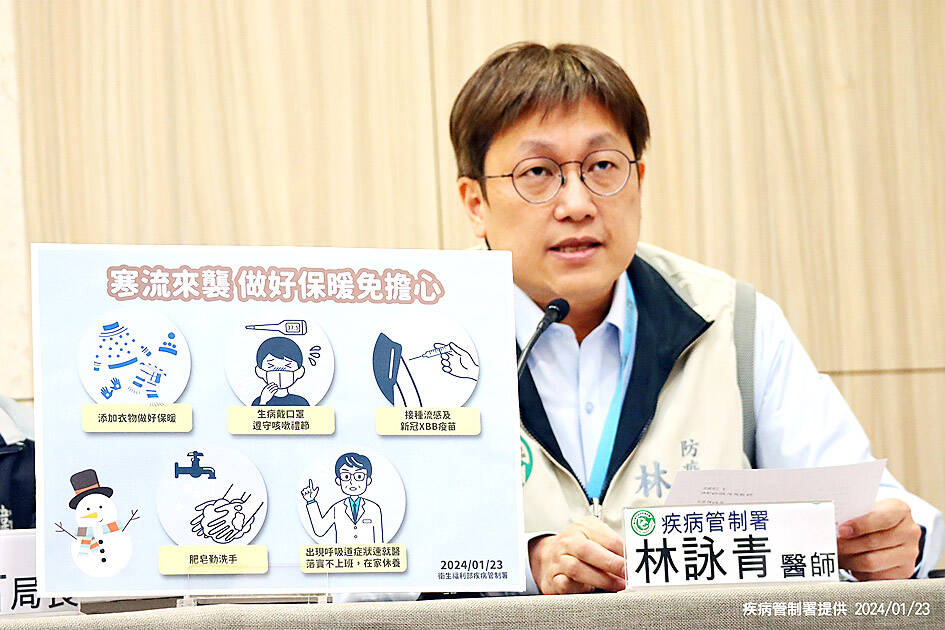The Centers for Disease Control (CDC) yesterday said a COVID-19 serological survey it conducted last year suggested that about 80 percent of the population contracted COVID-19 at least once before June last year.
The Central Epidemic Command Center in February last year said that it had entrusted the Taiwan Blood Services Foundation to work with the CDC on conducting a COVID-19 serology antibody survey.
About 7,000 samples of blood donated between January and June last year were randomly selected by the foundation, the donors’ personal information removed and the blood tested by the CDC for antibodies for the nucleocapsid protein of SARS-CoV-2, which could indicate prior infection.

Photo courtesy of the Centers for Disease Control
CDC Epidemic Intelligence Center Deputy Director Lee Chia-lin (李佳琳) said the samples were also selected through stratified sampling by age and residence, according to WHO guidelines, and the results showed that the trend in positivity rates between the six months matched that of the trend of case reports.
The positivity rate of COVID-19 antibodies in donors aged between 17 and 65 (the eligible age range for donating blood) was 61.5 percent among donors in January, and it gradually increased to 78.9 percent in June last year, data showed.
People aged between 17 and 27 had the highest positivity rate of 83.7 percent, while the rate decreased with age, with people aged 55 to 65 having the lowest rate of 75.5 percent, Lee said.
The CDC thanked the donors and the foundation for their contributions to the survey, she said.
Although nearly 80 percent of the population contracted COVID-19 at least once before June last year, the coronavirus mutates quickly and is highly transmissible, so people should stay up to date with their vaccinations for better protection, she said.
CDC Deputy Director-General Philip Lo (羅一鈞) said the survey suggests that only about 20 percent of the population were “chosen ones” — a nickname for those who have never contracted COVID-19 — by June last year.
As there was no significant increase in cases in the second half of last year and the nation is facing a fifth wave of infections, the “chosen ones” could have fallen to less than 10 percent of the population, he said.
Meanwhile, there were 127,638 hospital visits for flu-like illness, 30 serious flu complications and five flu-related deaths reported last week, Lee said, adding that flu-like activity remains at a high level, while respiratory virus surveillance shows that the most common viruses are adenoviruses (39 percent) and flu viruses (38.7 percent).
Lee said that 615 hospitalized COVID-19 cases and 44 related deaths were reported last week, adding that genome sequencing data shows that the EG.5 subvariant is the dominant strain circulating in the nation, accounting for 48 percent of sequenced cases, followed by the JN.1 strain at 41 percent.
Lo said hospital visits for flu-like illness and COVID-19 are estimated to reach a peak next week, but as flu viruses are expected to replace adenoviruses to become the most common circulating respiratory virus, and the JN.1 subvariant is expected to replace the EG.5 subvariant to become the dominant COVID-19 strain, the number of cases could increase again after the Lunar New Year holiday.

A relatively large earthquake may strike within the next two weeks, following a magnitude 5.2 temblor that shook Taitung County this morning, the Central Weather Administration (CWA) said. An earthquake struck at 8:18am today 10.2km west of Taitung County Hall in Taitung City at a relatively shallow depth of 6.5km, CWA data showed. The largest intensity of 4 was felt in Taitung and Pingtung counties, which received an alert notice, while areas north of Taichung did not feel any shaking, the CWA said. The earthquake was the result of the collision between the Philippine Plate and the Eurasian Plate, the agency said, adding

Snow fell in the mountainous areas of northern, central and eastern Taiwan in the early hours of yesterday, as cold air currents moved south. In the northern municipality of Taoyuan, snow started falling at about 6am in Fusing District (復興), district head Su Tso-hsi (蘇佐璽) said. By 10am, Lalashan National Forest Recreation Area, as well as Hualing (華陵), Sanguang (三光) and Gaoyi (高義) boroughs had seen snowfall, Su said. In central Taiwan, Shei-Pa National Park in Miaoli County and Hehuanshan National Forest Recreation Area in Nantou County saw snowfall of 5cm and 6cm respectively, by 10am, staff at the parks said. It began snowing

HOLIDAY EXERCISE: National forest recreation areas from north to south offer travelers a wide choice of sights to connect with nature and enjoy its benefits Hiking is a good way to improve one’s health, the Forestry and Nature Conservation Agency said, as it released a list of national forest recreation areas that travelers can visit during the Lunar New Year holiday. Taking a green shower of phytoncides in the woods could boost one’s immunity system and metabolism, agency Director-General Lin Hwa-ching (林華慶) cited a Japanese study as saying. For people visiting northern Taiwan, Lin recommended the Dongyanshan National Forest Recreation Area in Taoyuan’s Fusing District (復興). Once an important plantation in the north, Dongyanshan (東眼山) has a number of historic monuments, he said. The area is broadly covered by

Global bodies should stop excluding Taiwan for political reasons, President William Lai (賴清德) told Pope Francis in a letter, adding that he agrees war has no winners. The Vatican is one of only 12 countries to retain formal diplomatic ties with Taiwan, and Taipei has watched with concern efforts by Beijing and the Holy See to improve ties. In October, the Vatican and China extended an accord on the appointment of Catholic bishops in China for four years, pointing to a new level of trust between the two parties. Lai, writing to the pope in response to the pontiff’s message on Jan. 1’s